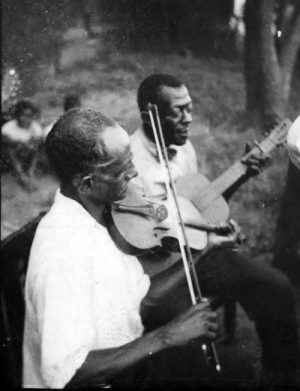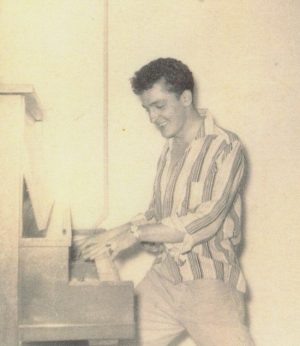Morton learned to play the piano at an early age and was already performing in the brothels of the Storyville district of New Orleans at the age of 14, where he acquired the name “Jelly Roll”, a euphemism for a lady’s private parts. The song “Winin’ Boy Blues” dates back to this early era. At that time, jazz was also being formed by musicians such as Buddy Bolden (1877-1931), Kid Ory (1886-1973), King Oliver (1881-1938) and Sidney Bechet(1897-1959). Although Jelly Roll Morton famously claimed to have invented jazz, all agree that he was a very predominant pioneer of the genre.
When Morton’s grandmother learned that he was playing the “devil’s music” in brothels, she disowned him for disgracing the LaMothe name. Morton started touring in the US South, working in minstrel shows and composing a great deal of his repertoire. In 1926, Morton signed with the Victor Talking Machine Company, recording until 1931, when his recording contract was not renewed due to the Great Depression. He briefly had a radio show in 1934, then toured in a burlesque band. In 1938, Alan Lomax (1915-2002), an American ethnomusicologist best known for his numerous field recordings of folk music, invited Morton to record for the Library of Congress. Because of the suggestive nature of these recordings, some of them were not released until 2005. They were issued as 8 CDs and two booklets, a collection which won two Grammy Awards in 2006 as well as awards for Best Historical Album and Best Album Notes. The sessions expanded to over eight hours, with Morton talking and playing piano all along. Lomax was interested in Morton’s days in Storyville and the ribald songs of the time. A long and bawdy version of “Winin’ Boy Blues” was recorded by Lomax but, thankfully, some more decorous versions were also recorded afterwards. The song makes mention of stavin’ chains, an expression open to much interpretation. In a Lil Johnson (places of birth and death unknown) 1937 recording of her song “Stavin’ Chain,” he was the chief engineer on a train who possessed great strength and stamina. The term “staving chain” may come from the chains used by barrel manufacturers to hold barrel staves together until an iron band can be fitted around the end of the barrel. Another theory is that staving chain was the name for the chain used to chain prisoners together by their ankles in a chain gang. Jelly Roll Morton believed that Stavin’ Chain was the name of a pimp in New Orleans while Stavin’ Chain, also known as Wilson Jones, was an American blues musician that Lomax himself photographed and recorded in 1934.Shortly after the Library of Congress recordings, Morton was stabbed in a fight with a friend and suffered wounds to the head and chest. A nearby whites-only hospital refused to treat him, as the city had racially segregated facilities at that time. He was transported to a black hospital where doctors left ice on his wounds for several hours before attending to the injury. His recovery from his wounds was incomplete, and thereafter he was often ill and easily became short of breath. He continued to suffer from respiratory problems when he traveled to Los Angeles with the intent of restarting his career. He died on July 10, 1941, after an eleven-day stay in the Los Angeles County Hospital.
I think of my brother Gabriel (1936-1959) most every day but especially when I hear the sound of a piano from a distant past, like that of Jelly Roll Morton. At a time when everyone treated me like the child I was, Gabriel insisted on treating me like a person and took the time to teach me, despite our fourteen-year difference in age, the wonderful grown-up world of music. I wouldn’t be playing if not for him.The pictures of Morton and Jones/Amos are in the Public domain.
To hear the recording, click on the song title below.
Richard Séguin – voice, acoustic guitar, mandolin




